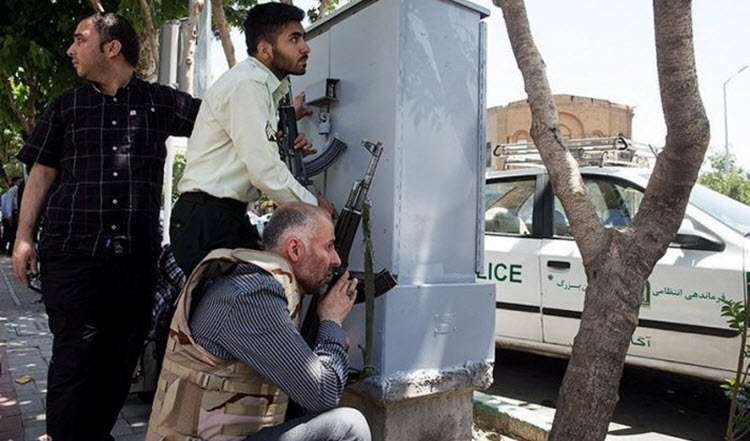
Over the weekend, the Iranian regime announced their theory that the U.S. is to blame for birth and growth of ISIS. The theory came after the recent twin attacks in Tehran.
Armstrong Williams, who was an advisor and spokesman for the presidential campaign of Dr. Ben Carson, and is a radio host, talked about this claim in a piece in the Hill. “It is also important to recognize the significant role that symbolism plays in both Iranian and Middle Eastern cultures. Which is why the second terrorist attack targeting Ayatollah Ruhollah Khomeini’s tomb complex, the leader of Iran’s Islamic revolution, was a veritable attack at Iran’s core,” he writes, adding, “These twin terror attacks, striking the mullahs’ parliament and shrine to the Khomeini, represent a very painful bitter pill for the Iranian regime to swallow.”
Williams continued, “ISIS, the Taliban and al Qaeda have also received support from the extremist Iranian mullahs, which is ironic since each of these terrorist groups’ ideologies are determined to eradicate Shi’ism, which just happens to be the religious backbone of the Iranian regime. And the reason for this twisted terrorist support is sickening: Tehran sees benefit in forming tactical alliances with these terrorist entities because they too loath America, and are motivated by a virulent anti-West agenda.”
Although Iran’s news media and the Iran lobby try to portray the combatants in Syria as split on sectarian lines — Sunni vs. Shia, with Iran fighting ISIS. Meanwhile, Iran is happy to divert attention from its own actions in Yemen, Iraq and the Persian Gulf.
Amir Basiri, a contributor to the Washington Examiner’s Beltway column, explained how the Iranian regime and ISIS benefit each other.“The Islamic State clearly owes its rise to Tehran. The violence caused by Iran’s Revolutionary Guards and its affiliates in Iraq and Syria created the perfect breeding ground for the emergence of the Islamic State and allowed it to occupy large swathes of land in both countries,” and says further, “Reciprocally, the Islamic State returned the favor, causing rampage that provided Iran with the perfect excuse to increase its meddling in neighboring countries. Under the pretext of fighting the Islamic State, Tehran founded and legalized the Popular Mobilization Forces, an umbrella for extremist Shiite groups backed by Iran. The Islamic State also became Iran’s excuse to openly intervene in the Syrian conflict and shore up the Assad regime against opposition forces.”
“This is a reminder that Iran is not part of the solution in fighting the Islamic State or other extremist groups. Islamic fundamentalism can only be eradicated if it is fought in its entirety. This will require the eviction of the Iranian regime and the Revolutionary Guards from the region and the total dismantling of its terrorist proxies,” Basiri adds.
The Iranian regime is already attempting to solidify its presence in Iraq the appointment of a new Iranian ambassador to Iraq from its Quds Forces. Iran’s most prominent economic daily reported that Iraj Masjedi arrived in Baghdad to take over Iran’s embassy there. Masjedi is a brigadier-general in the Quds Force who served in several leadership roles in forward operating bases during the Iran-Iraq War. The Iranian press described him as a senior advisor to Quds Force leader Qassem Soleimani.
The news reports that a blast that killed three people and injured 15 others on Friday, in the Iraqi city of Karbala, had an Iranian link. “After the explosion and during the investigation and inspection on Friday night, the Iraqi intelligence forces arrested five Iranians who had explosives and remote control devices at the area near the blast site, in the eastern Abbasid,” an official said on condition of anonymity. “The security forces transferred the Iranian detainees to the Karbala intelligence headquarters for interrogation,” the source said. “But minutes later dozens of Brigade Ali Akbar and Badr Organization militias supported by Iran surrounded the headquarters of the intelligence of Karbala.”
The source also said that a demand by the militias for the release of the five Iranian detainees was rejected by the head of intelligence, who stated that he will only hand them back to authorities in Baghdad. This refusal was followed by armed militias breaking into the intelligence headquarters, and taking the five detainees, as well as the head of the intelligence department.







